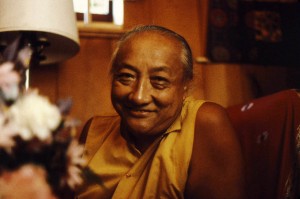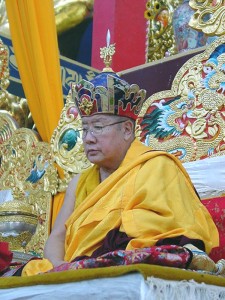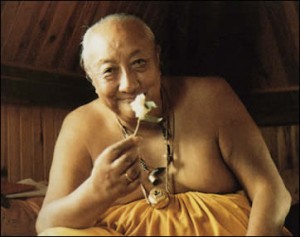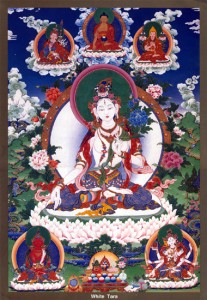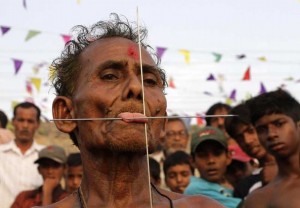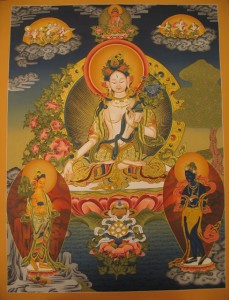
The following is an excerpt from a teaching by Jetsunma Ahkon Lhamo called “The Bodhisattva Ideal”
When we first enter onto the Bodhisattva path, we are thinking that maybe we are doing this because we’ve always wanted to be a good person. We have all kinds of mixed motivations. Maybe we never got enough approval when we grew up. Maybe mama was always telling us that we were never going to amount to very much, or something like that. Maybe dad was always telling us that we have to live our lives in a certain way in order to meet with his approval. Maybe our society has taught us that if we don’t attain certain things we are a “n’er do well.”
For whatever reason, when we first meet with the Bodhisattva path, we think that we are going to make something good of ourselves. We are going to approve of ourselves, finally. We are going to be good people. We fall in love with the romance of being saintly. But ultimately, the life of a Bodhisattva has not one thing to do with that, nothing to do with that. The purpose, the intention, the planning of a Bodhisattva is not according to that. The planning of the Bodhisattva is based on logic and reason. Since we have met with the ideal of the Bodhisattva, this is the time for the beginning students, or the student who has been a practitioner for some while, to really determine for oneself what the true meaning of the Bodhisattva ideal actually is—to see the reasonableness of it, to see the logic of it. To understand that to do anything else is to walk through one’s life as a child, mindlessly, just grabbing and playing and having “la la” land in your head. The life of a spiritually mature Bodhisattva is a life of understanding, a life of clarity, a life of reasonableness, a life in which that spiritual participant thinks in full equations, which ordinary people simply do not do.
Now, having learned these virtuous patterns, these virtuous habits, these virtuous actions, and understanding that this is what results in happiness, and not grabbing in an egocentric way, the spiritually mature Bodhisattva begins to plan, and begins to understand also, that according to the Buddha’s teaching, all sentient beings are in that same condition of revolving hopelessly in samsara. Not understanding what the components of happiness are and what brings relief from suffering. Not understanding as well, what intensifies suffering and makes it much worse. Sentient beings literally are revolving in samsara helplessly, like bees flying around in a jar, not understanding how to get out, just bumping, bumping, bumping on all the sides.
Having looked at that, having looked at the suffering of the world, having seen that in places all over the world there is hunger, there is war. There is disease, old age, sickness and death constantly claiming even those on the seen realms where there is less suffering than in many of the other realms. And, according to the Buddha, we are taught that in the unseen realms, all sentient beings are suffering horribly. They have no understanding really of what makes the cessation of suffering. Having met with the path and understood all these things, and then understanding as well the Buddha’s teachings, then we make an intelligent choice. “I and all sentient beings have been wandering helplessly and hopelessly in samsara, not understanding the cause of my suffering, not understanding the cause of the suffering of other, not understanding the causes of happiness for myself and others. Now I have come to this place of choice, intelligence, clarity and responsibility. Therefore, having seen the truth and understanding that there is an end to suffering, I will practice for the sake of sentient beings.” This is the choice that the spiritually mature Bodhisattva brings—to practice temporarily by bringing happiness and relief to those that they can in any way possible. And then to practice ultimate or extraordinary Bodhicitta, which is to bring the ultimate happiness, the ultimate joy of the revelation of the path to others so that they too might attain ultimate happiness. The spiritually mature Bodhisattva chooses to give others the method by which they can end their suffering and gain happiness, the method of clarity that teaches that virtuous seeds bring virtuous and joyful results, and nonvirtuous seeds bring nonvirtuous and negative results. Understanding that, I myself will be a guide and a light to benefit others through their confusion. The prayer of the Bodhisattva is that we would live and exist as a Bodhisattva long enough to be the one to watch the very last of them cross over through the doors of liberation into freedom. That is my prayer and that should be the prayer of each and every one of us, that we would be the last and would be able to see every single sentient being cross the ocean of suffering into freedom.
Copyright © Jetsunma Ahkon Lhamo. All rights reserved



